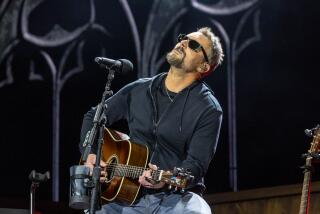Dancing on the grave of the movies
Mikel Rouse’s latest music-theater piece -- the third in a trilogy that includes meditations on trash TV talk shows (“Dennis Cleveland”) and a murder case made famous by Truman Capote (“Failing Kansas”) -- turns to movies and their demise, at least as an art form. That’s a bad thing. And a good thing.
At Saturday night’s performance of Rouse’s “The End of Cinematics,” given its West Coast premiere by Orange County’s Philharmonic Society at the Irvine Barclay Theatre, the bad came first. Rouse begins by projecting on a scrim in front of the stage dumb trailers for dumb movies -- “Get Smart,” “Alvin and the Chipmunks,” “Superbad.” Next comes a quote from a grumpy French cinematic genius, Jean-Luc Godard. “I await the end of cinema with optimism,” he says.
To a certain extent, “The End of Cinematics” -- with its irresistible pop songs, mysterious lyrics and heaps of attitude onstage -- dances on the movies’ grave. Rouse writes in his program note that his starting point was a pair of essays by Susan Sontag in which she mourned the way Hollywood had made the art form unlovable.
Rouse mourns that too. But he also looks for new options in an era of divided attention. He is a composer with allegiances hard to parse. He writes what sounds like straight-ahead pop music, yet he also has a foot firmly in the abstract, high-modernist avant-garde. His wife, Lisa Boudreau, who appears in the film component of the new work, is a dancer in Merce Cunningham’s company, and Rouse has written music for Cunningham as well.
“The End of Cinematics” sounds, at times, a lot like the Beatles.
There are five performers onstage who sing, dance a little and assume postures that are pregnant with unspecific meaning in an MTV sort of way.
These performers are projected larger than life on the scrim in front of them, along with some atmospheric film clips shot in Paris. Behind them are six screens with more fragmented Paris tidbits.
An ominous, film-noir air pervades the short (71-minute) show with its 14 songs. The three men (Rouse is one) and three women onstage favor rainwear -- trench coats for the men, a checkered style for the women. The women all have the same black hairstyle.
Rouse’s songs are deceptively simple. He creates numerous levels of music and meaning. The instrumentals are prerecorded keyboards (Rouse) and percussion (Rob Shepperson) put together with various techniques from Minimalism. The resulting overlapping rhythms can be as interestingly complex as a Steve Reich score.
As a singer, Rouse can do an OK imitation of Paul McCartney, but that’s just a starting point. He typically phases himself with other voices. The ear recognizes everything but gets befuddled anyway.
Rouse sings of the American dream, desired and honored but ever elusive. The movies, we want to believe, are us. But they trick us by comforting us, by diverting us, by entertaining us, whereas the real world is simply out to get us. Movies ask us to dream, not think. “I didn’t think, I didn’t dream,” Rouse counters in his second song, “Women Are Men.”
Rouse’s visual images are -- much like pop music videos -- eye candy. He pays homage to old movies and includes, along with the shots of Paris, bits of the starry sky.
Visually, he attempts to re-create moviegoing’s great attraction, which is the complete absorption of the senses, but Rouse changes priorities. Music here drives everything, if not quite to the point of overwhelming the other senses.
In his best Beatle voice and with his catchiest harmonies, Rouse sings, “I can’t tell the right from the wrong thing.” I sometimes couldn’t either. The amplification on Saturday night was too loud for the intricacies of the music; the visuals and staging sometimes started to feel like a postmodern theatrical review, never inappropriate but not always fresh.
On a musical level, however, “The End of Cinematics” feels like the beginning of something new. It is available on iTunes, and heard by itself, sounds unlike any other pop music. In fact, this listenable, addictive score does what cinema used to do when it still felt new -- entertain and amaze.
But I’m sorry to report, movies still rule.
The Irvine Barclay Theatre drew but a fraction of the crowd lining up at the art-house cineplex across the way.
--
More to Read
The biggest entertainment stories
Get our big stories about Hollywood, film, television, music, arts, culture and more right in your inbox as soon as they publish.
You may occasionally receive promotional content from the Los Angeles Times.






